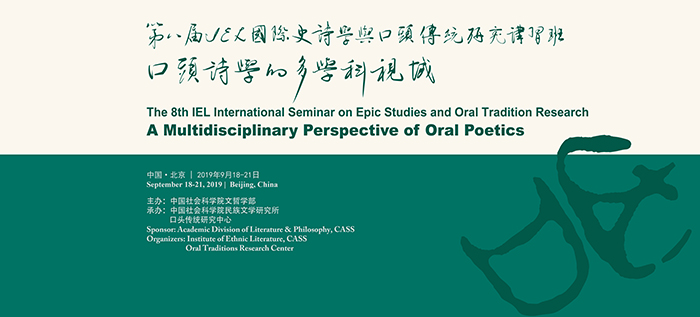
第八届“IEL国际史诗学与口头传统研究讲习班”举办在即,本届讲习班的主题是“口头诗学的多学科视域”。藉此机会,我们热烈欢迎各位学员和老师的到来!本届讲习班由中国社会科学院文哲学部主办,中国社会科学院民族文学研究所及其口头传统研究中心联合承办。
“IEL国际史诗学与口头传统研究系列讲习班”(IEL International Seminar Series on Epic Studies and Oral Tradition Research, 简称“IEL国际口传讲习班”,IEL-ISSESOTR)是在中国社会科学院科研局和国际合作局的支持下,由民族文学研究所及其口头传统研究中心于2009年创办的长线发展的跨学科专业集训项目,旨在通过专业集训和国际对话,推进史诗和口头传统研究的持续发展。2009年至2017年,讲习班已举办七届,课程主题涵盖“理论、方法论和学术史”“文化多样性及研究范式的转换”“口头文类与跨文类”“创编、记忆和传播”“文本与语境”“传承人与社区”“田野研究和数字化建档”“口头传统与IT技术和互联网”,以及“史诗传承的多样性与跨学科研究”“图像、叙事及演述”等诸多研究领域,且涉及中外古今数十种语言传统的个案研究。这七届讲习班先后汇集了超过70余所国内外著名高等院校的数百位专家学者和研究生,在学术交流和人才培养方面取得了预期效果。
本届讲习班的主题为“口头诗学的多学科视域”,旨在探讨口头叙事与不同感官表达之间的关系问题,从单一学科话语与方法的建构向跨学科研究范式的转换,强调口头叙事传统中多重感官创造力的综合阐释与研究。长期以来,在民间生活实践中,民间文化(含民间文学、民间艺术)通常作为一个整体,以口头、活态的方式展现及传承。在学术研究领域,民间文化却被分割为不同的表达样式,单一学科的研究方式使得我们无法触摸其整体表达规律。值得我们思考的是:在不同的表达话语体系中,何为叙事表达单元、叙事结构关系是如何搭建的;在口头演述或表演语境中,各艺术门类如何赋予局部与整体结构以传统性指涉意义,如何通过传统认知分类的结构或特定符码来索引传统的。一方面,口头传统与民间艺术在叙事话语的创造与接受层面共享着一套叙事通则与策略。另一方面,它们又以各自的话语表达建构着听觉、视觉、触觉等不同感官的叙事文本。同时,口头传统与民间艺术又存在叙事间互涉、跨文类的表达关系。因此,在未来的学术研究中,我们需要全观、跨学科的研究视野与方法工具。
本届讲习班将集中探讨世界范围内口头传统的动力机制和人类表达文化中互为交织的内在叙事性,通过召集来自不同专业领域的杰出学者,为青年学人和硕士、博士研究生与专家近距离交流搭建一个开放性的对话平台。此次讲习班的主要议题有:
(1)口头传统的全观表达;
(2)民间音乐叙事的创编法则;
(3)民间美术的叙事模式;
(4)口头传统与民间艺术的叙事互涉;
(5)与口头传统和多重文化表现形式相关的其他议题。
本届讲习班为期四天,分“专业集训”和“青年口头诗学研修”两个模块。“专业集训”模块(9月18-19日)以专题讲座方式集中授课;“青年口头诗学研修” 模块(9月20-21日)以系列讲座方式开展研讨。
在此,我们对各位同仁的参与、贡献和专业分享致以由衷的谢忱!
中国社会科学院民族文学研究所
口头传统研究中心学术指导委员会
2019年9月11日
A BRIEF INTRODUCTION
Time has come for colleagues at the Institute of Ethnic Literature of the Chinese Academy of Social Sciences (IEL, CASS) to cordially welcome trainers and trainees to the 8th IEL International Seminar Series on Epic Studies and Oral Tradition Research (IEL-ISSESOTR) on the thematic topic: “A Multidisciplinary Perspective of Oral Poetics.” This seminar is jointly organized by IEL and its Oral Traditions Research Center, with the support of the Academic Division of Literature and Philosophy of CASS.
IEL-ISSESOTR seminar series are a project with the purpose of realizing sustainable development of the research on epic and oral traditions by training young scholars in China and enhancing international academic communication. This project has been launched in 2009 with the support from the Bureau of Scientific Research Management (BSRM) and the Bureau of International Cooperation (BIC) of CASS. The actual training program has been organized by IEL and its Oral Traditions Research Center. From 2009 to 2017, the seminar series had witnessed 7 successful sessions, featuring: theory, methodology and academic history; cultural diversity and shift in research paradigm; oral genres and cross-genres; composition, memorization and transmission; texts and contexts; inheritors and communities; field study and digital documentation; oral traditions and IT technologies in the era of internet; the multiform of epic traditions and interdisciplinary research; image, narrative and performance; etc.. These seminar series engaged with multiple areas of research and introduced case studies of more than ten linguistic traditions across the globe and in all historical periods. Hundreds of experts and young scholars from more than seventy domestic and foreign universities had been brought together by the seminar series, making tremendous achievements in terms of academic communication and the training of young scholars.
The theme of this year’s seminar is “A Multidisciplinary Perspective of Oral Poetics.” It is designed to discuss the relationship between oral narrative and expressions targeting different human senses; paradigm shift from the construction of discourse and methodology basing on one discipline to an interdisciplinary research mode; and the significance of a holistic interpretation and research of human creativity based on multiple senses in oral narrative traditions. Practically in the folk’s everyday life, folk culture(including folk literature, folk art, etc.)has been orally expressed and transmitted as a living unity. In academic research however, folk culture has been divided into various expressive forms, reserved for different disciplines. This research method prevented scholars from obtaining a holistic picture of folk culture or its inner logic. It is worth reflecting on what is a narrative unit and how narrative relations are organized in different discursive systems; how different art forms grant traditional referential meanings to parts of or the whole text in the context of oral performances; and how traditions could be indexed through the structures of traditional worldviews or specific cultural codes. On the one hand, oral traditions and folk art share rules and strategies of expression on the plane of production and reception of “texts.” On the other hand, they have their specific discourses and expressions in the creation of narrative “texts” for different senses such as sight, touch, and sound. Besides, oral traditions and folk art intermingle in an expressive relationship constructed by mutual referentiality, cross-genre expression and so forth. Therefore, in future academic research, a holistic and interdisciplinary perspective and research tools are required.
The 8th seminar is to provide a forum in which graduate students and early-career scholars could directly communicate with prominent scholars, to open up profound discussion about mechanisms of oral traditions around the world and the inner narrative logic in the intertwined human expressive cultures. This seminar will be devoted primarily to the following topics:
1. Holistic expression of oral traditions;
2. Composition rules for folk musical narratives;
3. Narrative modes of visual folk art;
4. Mutual referentiality of oral traditions and folk art;
5. Other relevant topics about oral traditions and multiple forms of expressive culture.
This four-day academic event contains two Modules: 1. The Professional Trainings Module (Sept. 18-19) providing thematic lectures; and 2. The Youth Workshop on Oral Poetics Module (Sept. 20-21) featuring discussion and workshops.
We greatly appreciate your participation, contribution and expertise-sharing.
Steering Committee for
Oral Traditions Research Center (OTRC)
Institute of Ethnic Literature (IEL)
Chinese Academy of Social Sciences (CASS)
September 11, 2019
凡因学术公益活动转载本网文章,请自觉注明
“转引自中国民族文学网(http://iel.cass.cn)”。


